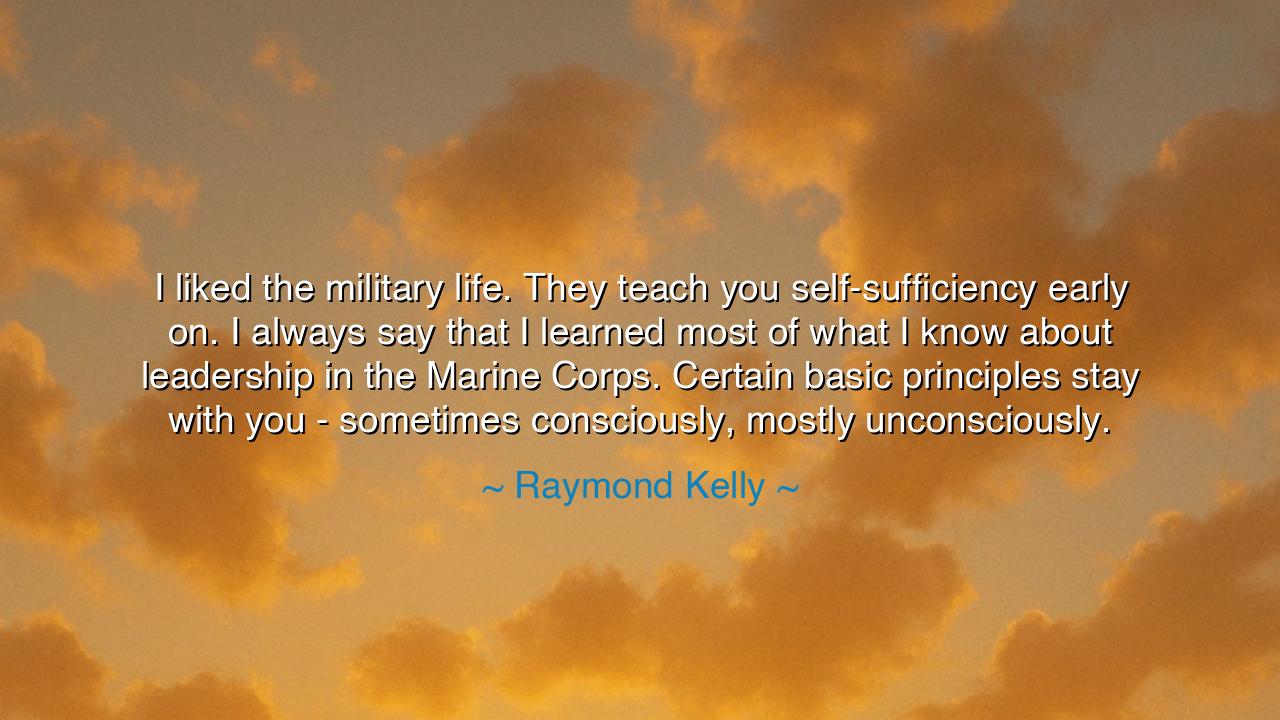
I liked the military life. They teach you self-sufficiency early
I liked the military life. They teach you self-sufficiency early on. I always say that I learned most of what I know about leadership in the Marine Corps. Certain basic principles stay with you - sometimes consciously, mostly unconsciously.






The words of Raymond Kelly—“I liked the military life. They teach you self-sufficiency early on. I always say that I learned most of what I know about leadership in the Marine Corps. Certain basic principles stay with you—sometimes consciously, mostly unconsciously.”—speak with the authority of one who has lived under the discipline of arms and carried its lessons into the wider world. They remind us that the military life is not merely about combat, but about shaping the character, fortifying the will, and instilling principles that endure long after the uniform is set aside.
To learn self-sufficiency early is to discover the strength of standing firm in adversity. In the crucible of military training, a young recruit is stripped of comfort, tested in body and spirit, and taught to rely upon skill, discipline, and courage rather than luxury or ease. Kelly speaks of this with gratitude, for it is in hardship that one discovers the ability to endure, to act decisively, and to persist when all else seems lost. This lesson, once learned, does not fade—it becomes the hidden backbone of character.
He declares also that he learned the essence of leadership in the Marine Corps. Leadership here is not the shallow command of authority, but the deeper art of guiding others, of sharing burdens, of showing the way by example. The Marine Corps, like the legions of Rome or the phalanxes of Greece, understood that the strength of the unit lies not in orders shouted from above, but in trust earned through sacrifice. A leader does not simply direct—he inspires, protects, and carries. Kelly’s words echo this ancient wisdom, that leadership forged in service is leadership that endures.
Consider the story of George Washington, who, though born of privilege, proved his worth in the hardships of military life. At Valley Forge, amid cold and hunger, he shared in his soldiers’ suffering, and in so doing, won their loyalty. His authority did not rest on rank alone, but on the visible example of endurance and care. Like Kelly, Washington carried the principles of military leadership into his later life, guiding a nation not by tyranny, but by the quiet strength of one who had suffered and stood alongside his men.
Kelly notes that such principles remain consciously and unconsciously within those who have lived them. This is the great power of discipline: it does not merely instruct the mind, it engraves itself into the soul. The one who has learned self-sufficiency does not pause to calculate resilience when hardship comes—he simply endures. The one who has practiced leadership under fire does not rehearse inspiration when fear strikes—he naturally steadies those around him. These lessons, drilled into the marrow of a Marine, become habits of life that flow into every endeavor, whether in war, in governance, or in daily duty.
The lesson for us all is clear: seek out the disciplines that forge strength, embrace the hardships that teach endurance, and carry forward the principles that make true leadership possible. Do not shy from difficulty, for in difficulty lies growth. Do not crave only comfort, for comfort never strengthens. Instead, cultivate habits of service, responsibility, and resilience, for these will remain with you, even when you do not think of them, guiding your choices and shaping your destiny.
So, O seeker, take these words of Raymond Kelly as a call. You need not wear the uniform of a Marine to learn its wisdom. In your work, in your family, in your community, practice self-sufficiency and live by principles that endure. Lead not by command, but by example. And when life tests you, as it always shall, let the discipline you have sown carry you forward, both consciously and unconsciously, as a torch in the darkness, and as a beacon for those who walk behind you.






AAdministratorAdministrator
Welcome, honored guests. Please leave a comment, we will respond soon